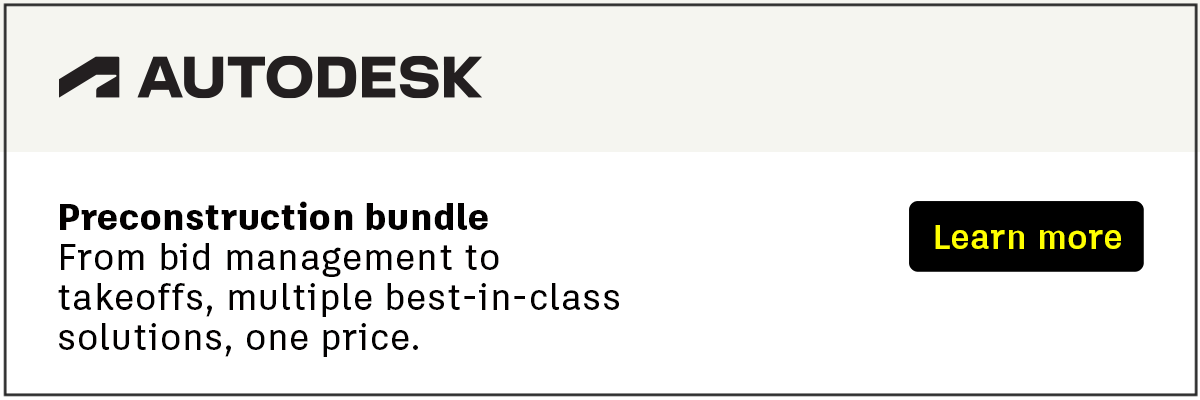
Successful construction projects don’t happen by accident. The most impressive structures and facilities we see today are likely a result of meticulous and well-coordinated planning that took place before the project broke ground.
Well-executed projects stem from proper preconstruction planning, a process that’s carried out before the actual construction begins. Preconstruction activities ensure that the design and built phase goes smoothly and without any major problems.
Think of it as creating a roadmap for the project as a whole. A preconstruction plan outlines how to execute the project.
What we cover:
Planning is essential when you’re embarking on any project, but it’s particularly critical in construction, due to the complex nature of projects. Let’s take a closer look at the benefits of preconstruction planning.
Preconstruction planning gives all stakeholders the opportunity to get on the same page to discuss the crucial project details—including objectives, design, schedule, budget, etc. It promotes the right expectations and keeps people aligned at the beginning of the project, ensuring that it kicks off on solid ground (figuratively and literally).
Watch more:
Proper planning helps stakeholders identify potential problems before they happen. This mitigates risk and uncertainty, ultimately increasing the chances of a successful and well-executed project.
A big part of preconstruction planning is ironing out the project’s timeline. It gives everyone clarity on what activities need to happen and by when. When teams have a pre-determined schedule, they’re more likely to meet the required milestones on time, thus preventing delays.
All of the above benefits lead to a healthier bottom line. Having a well-coordinated project that experiences fewer mistakes and delays means everyone spends less time and money putting out fires. This results in higher profitability—something that’s critical in a low-margin industry like construction.
Aside from promoting smooth project execution, preconstruction planning also helps teams build stronger relationships. It encourages transparency and communication among stakeholders, in turn leading to a better working environment. When done right, it makes people want to work with you more, which paves the way for additional collaboration opportunities.

Preconstruction teams are responsible for the planning and organization of construction processes before they’re carried out. Here are some of their tasks and responsibilities.
Construction projects require teams to file and submit paperwork in order for various activities to move forward. The preconstruction team must manage these documents and make sure they’re completed by the right people at the right time.
Such documents include:
Request for Proposal (RFP). When an owner intends to start a construction project, they issue an RFP to announce the job, describe the project, and request bids from contractors.
Interested parties then review RFP and put together a proposal for how they would execute the project.
On the owner side, those facilitating the construction RFP process are tasked with reviewing the submitted bids to determine which contractor to partner with. Meanwhile, those on the contractor side must carefully consider any RFP invitations and figure out which projects are worth bidding on.
Construction documents (CD). Once the owner selects a contractor, the project moves into the design stage. At this point, the architect comes up with a set of drawings for the project—often referred to as the construction documents. Depending on the job's scope, other consultants and contractors (e.g., HVAC, electrical, plumbing) are also brought in so they could contribute their expertise.
Permits. When the design process is complete, teams would need to submit the documents to the city in order to secure the necessary building permits. This process may require some back and forth depending on whether or not the designs are up to code. In any case, the preconstruction team is in charge of ensuring that permits are obtained.
Collaboration is vital, especially during the early stages of the project when key details are being ironed out. Because of this, preconstruction teams must facilitate communication between parties.
Keeping everyone informed and in sync. Preconstruction teams are in charge of syncing with stakeholders and keeping everyone updated. Doing this could mean scheduling meetings, sending status updates, touching base with people individually, or all of the above.
Following up on unanswered questions and loose ends. When planning complex projects, not all questions can be answered on the spot. In some instances, teams need to confirm their schedule before committing to a certain milestone. Maybe the contractor is waiting for the city to issue a permit. Whatever the case, the preconstruction team must be adept at tracking any unanswered questions and ensure they’re resolved in a timely manner.
As much as we want a project to unfold exactly as planned, this rarely happens in the real world. Projects often evolve and shift, as more details come to light and teams go into deeper discussions about how activities should be executed.
When this happens, it’s all too easy for people to lose sight of the original objectives or for the project to veer off course. It’s the preconstruction team’s responsiblity to realign everyone and bring their focus back to the job’s larger goals.
Now that we’ve covered the purpose of preconstruction planning and who’s involved, let’s discuss what actually happens throughout the process.
An effective preconstruction process starts off with a meeting between the project's stakeholders. There are several reasons to conduct these meetings:
To allow stakeholders to get to know each other. Preconstruction meetings enable the project’s key players to get some face time. This may not seem overly important, but seeing the people you work with (even when done virtually) can do wonders for team dynamics. When you’re able to put a face to the name, you feel more comfortable collaborating with them, thus improving communication and collaboration.
To review essential project details. Many preconstruction meetings are organized for the purpose of reviewing documents and confirming essential details. These meetings allow teams to go through project plans and other documentation together, ensuring that everyone is on the same page.
To answer preliminary questions. These gatherings also give people the opportunity to ask questions and gain clarity on everything from the project's scope and requirements to timelines and schedules.
Before moving forward with construction, teams need to conduct a field review of adjacent properties to ascertain their condition and visually identify signs of exterior and interior damage (e.g., roof damage), as well as any structural settlement.
Preconstruction teams must then produce a survey document, which outlines the existing conditions of the adjacent property. The objective is to protect the developer or contractor from any claims that may arise in the future.
For example, if the owner of the adjacent property claims that certain damages are a result of your team's project, you can refer to the preconstruction survey to confirm whether or not these issues existed before the construction took place.
Prior to hitting the job site, stakeholders need to identify any safety hazards or risks and create comprehensive construction site safety plans to mitigate them.
Risk assessment is particularly important in healthcare-related jobs.
For these projects, the preconstruction risk assessment (PCRA) is a must-do activity. PCRA is enforced by the Joint Commission, which recommends the following steps to ensure compliance:
Before construction can begin, parties must first determine the scope of the project. At this stage, stakeholders clarify what activities are included in the construction, and which elements are not part of the project’s scope. Ideally, all of these things are defined, documented, and shared with the wider team.
The budgeting stage is where contractors and owners discuss how much the project would cost. Here, teams need to account for expenses in various categories—including administrative, labor, as well as supplies and equipment.
To craft an accurate budget, preconstruction teams need access to the project scope and often have to collaborate with other stakeholders to get the most accurate figures.
Getting this right is essential, as having a well-thought-out budget improves project certainty and prevents overruns.
You can’t complete a project on time if you don’t have a solid schedule in place. That’s why a good portion of preconstruction planning is dedicated to ironing out your project schedule. Teams must specify all the tasks and activities required to complete the project, along with the duration for each task and any deadlines that must be met.
Just like with all project components, the schedule must be clearly outlined on paper and shared with everyone involved in the job.
The preconstruction planning stage is the phase of a construction project that occurs before construction begins. This involves the initial planning of the scope of the project, scheduling, budgeting, and everything else that will help a construction job get done.
Careful preconstruction planning will be extremely important to ensuring a job runs smoothly and is finished at the agreed upon date, under the set project budget. This preconstruction stage can take anywhere from a couple weeks to a few months, depending on the scale and scope of the job.
Since this planning period is such a vital part of a construction job, it doesn’t come for free, especially since the company or contractor who conducts the preconstruction planning may not even end up winning the bid for the job. The cost of the preconstruction stage will vary widely based on the scope of the project, the location, and other factors, but will typically not be a major expense.
The pre-production cost will generally end up in the range of one to three percent of the project’s total cost, although it is a completely separate fee and not built in. This preconstruction fee will be paid before a bid for the actual construction is even awarded, but it could lead to major savings throughout the process.
A construction job that begins without thorough preconstruction planning will likely not be prepared when issues arise. However, jobs with careful preconstruction planning will have contingencies built into the budget to handle most situations, keeping the project in line and on or near its original budget. There are other reasons pre-planning can lead to savings as well.
Although preconstruction planning will not be free, it could end up saving you big on a construction job in the end. This is for a variety of reasons.
First, during the preconstruction period, your contractor will build contingencies into the budget that will be there should things go wrong. The contractor will use his or her expertise and experience to predict certain scenarios and what they would cost and prepares for those circumstances within the budget. This way there are no surprise expenses should something go wrong, and the project will not go way off its timeline and budget.
By thoroughly pre-planning the construction job, the contractor will also be able to look for cost-saving opportunities. These may include cheaper building materials or components that could save hundreds to thousands of dollars on the jobs overall cost. They will also look for ways to boost the overall value of the finished product, which will be beneficial down the road.
Things like using sustainable materials or more energy-efficient components could make the building more “green” which can drastically cut down on energy bills for years to come. In the immediate, this may have value to you or your company should this match your philosophy.
All of these factors, along with the peace of mind that comes along with knowing that your project has been properly planned from start to finish, will boost the value of your construction job and make the initial cost of preconstruction all the more worth it.
Preconstruction planning takes work, but it’s definitely worth the effort. When implemented properly, preconstruction planning can save teams a great deal of time and money over the course of the project. It helps you reduce risk, costs, and rework so jobs are completed on time and on budget.
Autodesk has robust preconstruction solutions to help you plan your way to success. Discover how our construction platform can help you go from design to construction as efficiently as possible. Learn more.

